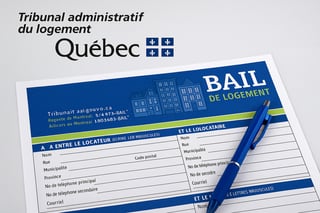
A Landlord’s Guide to Quebec’s Tribunal Administratif du Logement (TAL)
A Landlord’s Guide to Quebec’s Tribunal Administratif du Logement (TAL)
Ever had a tenant dispute and felt unsure where to turn? For landlords in Quebec, especially in Montreal, the Tribunal administratif du logement (TAL) is the main legal body that governs landlord-tenant relations. Whether you're dealing with unpaid rent, eviction proceedings, or lease disagreements, understanding how the TAL works is essential to protect your investment and operate legally.
QUEBEC RENTAL LAWSLEGAL TIPS
Benita K.
4/23/20253 min read
What Is the Tribunal Administratif du Logement (TAL)?
Formerly known as the Régie du logement, the TAL is Quebec’s specialized tribunal that handles residential lease disputes. This includes everything from rent increases to eviction requests and lease termination. It operates under the Civil Code of Quebec and is the landlord's go-to resource when facing legal issues with tenants.
When Should a Landlord Go to the TAL?
You can turn to the TAL when:
A tenant stops paying rent.
You need to terminate a lease early due to a serious breach.
You want to increase rent and the tenant refuses.
There are issues like property damage or unapproved subletting.
While some matters can be settled informally, documenting everything and applying to the TAL offers legal protection.
5 Key Things Every Montreal Landlord Should Know About the TAL
1. Filing a Complaint Is Easier Than You Think
You can file an application online through the TAL website. Fees range from $78 to $90 depending on the issue. Once submitted, you'll receive a date for your hearing, which typically occurs within 3 to 6 months, depending on the urgency of the case.
Montreal Tip: For non-payment of rent, hearings are often prioritized, sometimes within 10 to 45 days.
2. The TAL Favours Documentation
Always keep detailed records—lease agreements, payment receipts, written communication, and photos. The TAL bases decisions on evidence, not assumptions. If a tenant damages your apartment in Rosemont or refuses to pay rent in Verdun, photos and a signed lease are your best allies.
3. There Are Strict Timelines
If your tenant hasn’t paid rent for more than 21 days, you can apply to terminate the lease. But act quickly—delays could weaken your case. Similarly, if you're contesting a lease renewal or rent adjustment, make sure to notify the tenant within the correct legal timeframes, usually 3 to 6 months before lease renewal.
4. Evictions Must Go Through TAL
You can't just ask a tenant to leave—even for serious reasons like major renovations or owner-occupancy. All evictions must be approved by the TAL, and tenants may be entitled to compensation or relocation notice, especially in hot markets like Plateau-Mont-Royal or Griffintown.
5. Mediation Can Save Time and Money
The TAL offers mediation services, which can help resolve disputes faster than a formal hearing. This is ideal for less severe issues, such as disagreements over repairs or noise complaints. Both parties must agree to participate.
Final Thoughts: Know the Rules, Protect Your Property
Understanding how the TAL works gives you a serious edge as a landlord in Montreal. It’s not just about reacting to issues—it’s about being proactive. From keeping solid records to following the right procedures, small habits can make a big difference if you're ever called before the tribunal.
Need help navigating TAL disputes or managing tenants in Montreal?
Mujinga Suites Inc. is your trusted partner for hassle-free property management. We handle tenant screening, rent collection, legal notices, and maintenance, so you don’t have to. Let us help you stay on the right side of the law—and the right side of your peace of mind.
Let us handle the TAL paperwork. Contact us today to find out how we can support your rental business.
Let’s break down what TAL is, what it does, and how Montreal landlords can navigate it effectively.
Common Mistakes Montreal Landlords Make with TAL
Not responding to TAL notices promptly (this could lead to a default judgment against you).
Failing to serve documents properly—you must follow the TAL's rules for delivering legal notices.
Improper lease clauses—the TAL won't enforce clauses that go against Quebec's rental laws.






info@mujingasuites.com
© 2025 Mujinga Suites. All rights reserved.
Services
Contact Us
192-365 Saint Catherine Street East, Montreal, QC, H2X 3X2